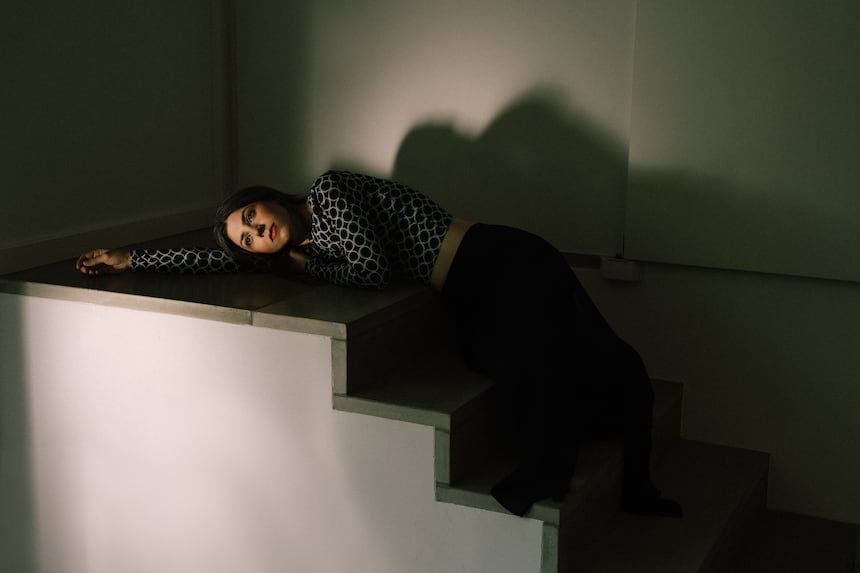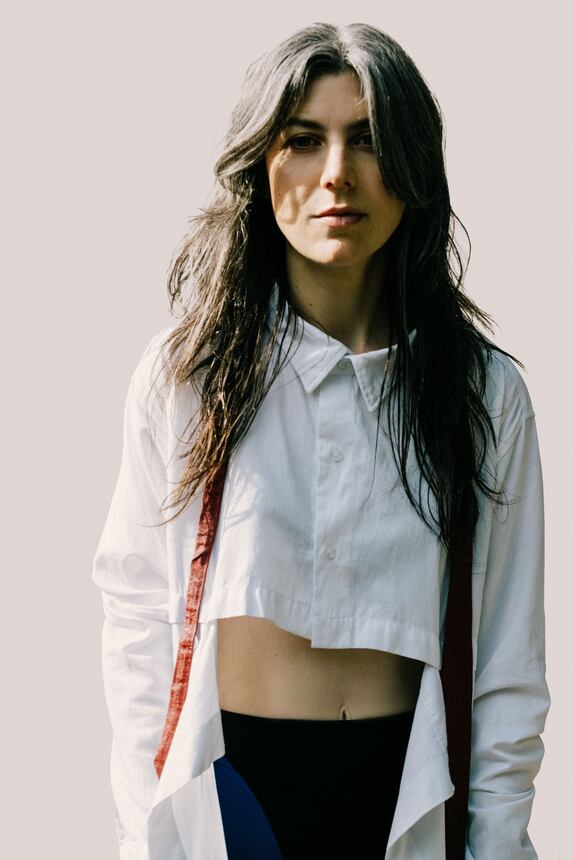What guides your creation the most?
Curiosity. I always want to find something without knowing what it is. I like not having preconceived ideas and just seeing what happens and being surprised.
Are you seeking new sounds?
I’m curious what sounds will do when they’re put together.
Your work is full of references to art and literature. How do you keep yourself curious?
I am not curious all the time. That’s the hardest part. Seeking that curiosity is so important because sometimes you’re dealing with all of this mundane stuff or you’re tired or you just don’t care and you have no imagination. That’s normal. I love being in awe of things but it doesn’t happen all the time. You have to be in the right headspace. I’ve done two or three workshops with an organization camp. I did two online during the height of the pandemic and then one in person, and they’re actually in France, in the Pyrenees. It’s called “Words, Non-Words and Music”. I was seeking the headspace for writing without feeling inhibited.
What in particular helped you find that headspace?
Writing Blind, a text by Hélène Cixous, helped. She’s French, so obviously I was reading the English translation. It’s capturing this state of mind where your brain can’t see, but your imagination can run and things come out, writing comes out, words come out. Spinning is about that text. At that time, I was struggling with motivation, because I was having a lot of different life changes all at once and I needed something to feel motivated. Or even if I couldn’t feel motivated, to remember what it feels like, at least. And so reading that text brings that sense of urgent human hunger for these moments of creation, in this case, music or whatever. In that “Words, Non-Words and Music” class, we read that text and everyone liked it because it’s so compelling.
And then I also found the Get Back documentary about the Beatles in 2021, like, a source of inspiration, because it was capturing the creative process in an amazing way, which is interesting to me because I’ve never really worked with people in that intense way. For composition, I’ve worked with friends, like one-on-one, but not very often.
I read somewhere you need the room to be messy for you to create. Where does that come from?
That’s weird. Not especially... Recently, I’ve realized I have this attention deficit, ADHD. It’s not a big deal, but I think that actually is part of it. In my creative process, gathering a lot of things is related to my curiosity of the unknown... I talked about this all the time with Aviary… Gathering all these sounds together and then seeing what works together in interesting ways.
How would you define the “unknown”?
Something you can’t see or imagine beforehand - before you see it or before you encounter it, maybe? I like not knowing what the music is going to sound like until I put the sounds together and then hear them.
So the “unknown” is ultimately your creation?
Something that I create within, I guess.
Some tracks from Something in the Room She Moves are much more heavily produced than others.
Well, there are differences. These Morning and the title track are less produced. On the contrary, Sun Girl and Evening Mood are very heavily produced. I worked on those a lot more. Honestly, if I’d had more time, I would have fussed with them more. But I think they’re cool as they are. They’re kind of more simple songs. There’s not as much interest in the production for me.

Gathering a lot of things is related to my curiosity of the unknown.
Do you think about performing the record live when you’re writing?
Performing and writing are so different. When I’m writing music, I don’t want to be limited by the things I will have during a performance. Performing is complicated because there’s so much logistical stuff, it’s very overwhelming. Planning a tour, for example, takes a lot of resources and administrative work and it’s very stressful. So for me to sit around and think I might not have this instrument when I perform, when I’m writing is an absolute no. Some people may actually function well in that strategic world but that would stress me out. It’s just innately so different from performing that there’s no hope in trying to make the two the same; the sound of a recording is just so different from the sound of a live show, because of the way you make things, and it’s just like a completely different feeling. I like making something new out of the song in a live setting that’s different from the recording.
Are limitations not something that help you create?
I don’t know. Limitations are good. Just the right ones. Not practical economic limitations. If we’re talking about recording, you can do so much with it. You could say I’m not going to have a lot of multi-tracked vocals, because I won’t be able to provide them on stage, so I just won’t multi-track the vocals. Okay, I’m not going to hire an orchestra for my recording because that’s going to be really expensive. Maybe the label would be into it, but not right now. Sometimes there are practical things with recording.

Yesterday, you did a listening session followed by a Q&A to accompany the release of the album. How do you feel when you meet and talk with your audience?
It’s challenging. Performing is easy but talking is scary. Addressing the audience is. You’re kind of acknowledging that you are a human, like everyone else. When you’re performing, you feel kind of supernatural. You don’t necessarily feel like you’re a superstar but you feel like… I’m not sure what the word is… Transforming? I don’t feel like myself. Some people have a different perspective, obviously. I’m transforming slightly into another state. I’m a little bit shy as well, so those confrontational moments can be funny. Also, I don’t have a crazy fan base of psycho people who are obsessed with my music.
The painting you chose for the cover looks like a transformation. Who painted it and what does it mean to you?
It’s a painting by Christina Quarles, that already existed and that she let me use for the record. It’s called “Wrestling”. I had a lot of trouble thinking about what cover to have for this record because I wanted to have this focus on the body but I couldn’t imagine having a photo of a body. It just sounded lame. I didn’t want it to be aggressive, but interesting and complex. Christina works so much with figures, bodies and interactions between bodies, the feelings of how one experiences one’s own body. In the case of this, maybe it’s sex or maybe it’s violent, maybe it’s very tender. It could be a lot of things all at once. And I like that multiplicity. There’s so many interesting, subtle, philosophical things going on in her work around being queer, the queer body, being biracial… There’s so many layers.
Layers are also a constant in your music. Are they a metaphorical way of protecting yourself?
This record doesn’t have a lot of layers compared to my other music because I just didn’t have time to have that many… It’s possible. I didn’t think of it like that, but it could be…






